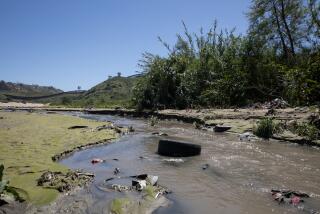Residents Would Pay to Clean Runoff, Survey Finds
Nearly two-thirds of county residents polled say they are willing to pay to clean up urban runoff, according to a survey by the Orange County Business Council and Cal State Fullerton.
A slightly smaller number of the 579 residents polled in a random telephone survey agreed that they would be willing to pay $5 a month to fund such efforts.
How the money would be assessed has not been addressed.
These latest numbers mesh with the results of a similar survey conducted in February, said Wallace Walrod of the Orange County Business Council.
The council began championing urban runoff clean-up efforts a few years ago, Walrod said, because the toxic mixture of bacteria and pollution from sprinklers, street-cleaning and car-washing closes beaches.
And closed, contaminated beaches don’t attract tourists.
Tourism is a $6-billion-a-year industry that officials say provides 140,000 jobs in Orange County.
During summer months, the Orange County Sanitation District treats about 2.5 million gallons of urban runoff each day from northern and western Orange County, said Bob Ghirelli, the district’s director of technical services.
“The problem with urban runoff is that it contains, for one thing, bacteria -- viruses that could potentially be harmful to swimmers,” he said.
County supervisors are scheduled to discuss the runoff issue today at 2 p.m. in the Hall of Administration in Santa Ana.
The discussion will include possible solutions and which county agency should lead the cleanup effort.
But sanitation officials who have studied the runoff problem stressed that plans are still in their infancy.
And no one is sure how to fund whatever solution is decided upon.
The slow decision-making process is fine with some, including Reed Royalty, president of the Orange County Taxpayers Assn., who says that if a fee-based solution is chosen, he wants to be sure it’s not just a disguised tax.
“A fee exists to benefit the people that it serves,” he said.
Therefore, any flat fee imposed on residents, despite how much or how little they use a given service, “sure sounds like a tax to me,” he said.
But that does not mean he is opposed to finding a solution and paying for it -- as long as the solution is scientifically proven to fix the problem, he said.
“Let’s not spend the money doing something that may not do any good,” he said.
Ghirelli said that any water treatment method would have a scientific foundation.
“That’s part of the equation if we’re going to convince the public that these monies are necessary,” he said.
More to Read
Sign up for Essential California
The most important California stories and recommendations in your inbox every morning.
You may occasionally receive promotional content from the Los Angeles Times.










